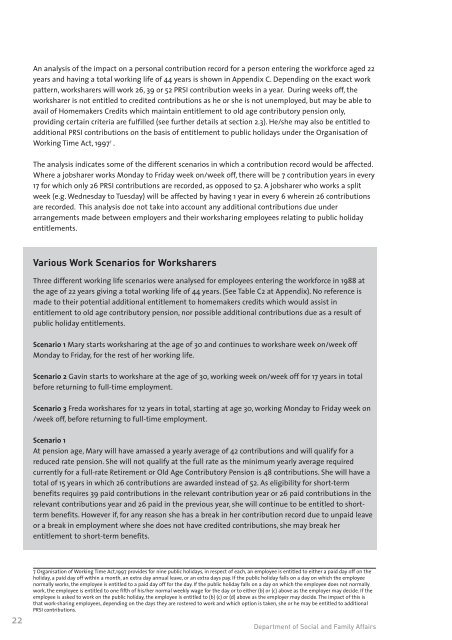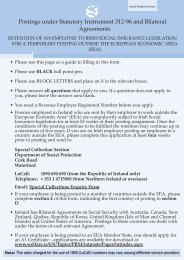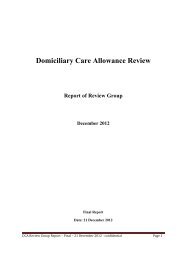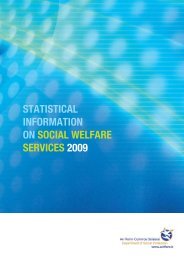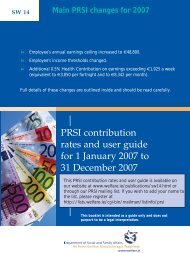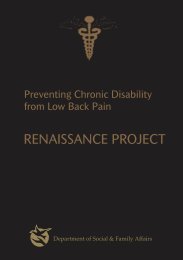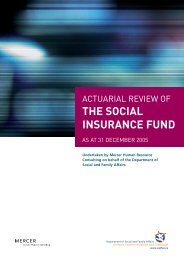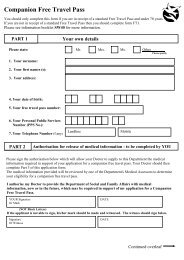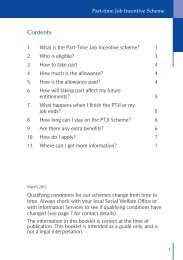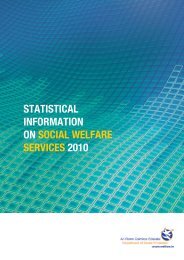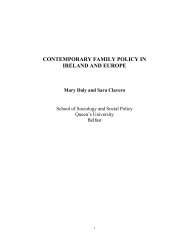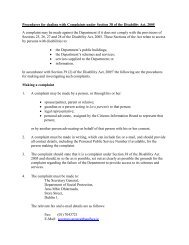Developing a Fully Inclusive Social Insurance Model - Welfare.ie
Developing a Fully Inclusive Social Insurance Model - Welfare.ie
Developing a Fully Inclusive Social Insurance Model - Welfare.ie
You also want an ePaper? Increase the reach of your titles
YUMPU automatically turns print PDFs into web optimized ePapers that Google loves.
An analysis of the impact on a personal contribution record for a person entering the workforce aged 22years and having a total working life of 44 years is shown in Appendix C. Depending on the exact workpattern, worksharers will work 26, 39 or 52 PRSI contribution weeks in a year. During weeks off, theworksharer is not entitled to credited contributions as he or she is not unemployed, but may be able toavail of Homemakers Credits which maintain entitlement to old age contributory pension only,providing certain criteria are fulfilled (see further details at section 2.3). He/she may also be entitled toadditional PRSI contributions on the basis of entitlement to public holidays under the Organisation ofWorking Time Act, 1997 7 .The analysis indicates some of the different scenarios in which a contribution record would be affected.Where a jobsharer works Monday to Friday week on/week off, there will be 7 contribution years in every17 for which only 26 PRSI contributions are recorded, as opposed to 52. A jobsharer who works a splitweek (e.g. Wednesday to Tuesday) will be affected by having 1 year in every 6 wherein 26 contributionsare recorded. This analysis doe not take into account any additional contributions due underarrangements made between employers and their worksharing employees relating to public holidayentitlements.Various Work Scenarios for WorksharersThree different working life scenarios were analysed for employees entering the workforce in 1988 atthe age of 22 years giving a total working life of 44 years. (See Table C2 at Appendix). No reference ismade to their potential additional entitlement to homemakers credits which would assist inentitlement to old age contributory pension, nor possible additional contributions due as a result ofpublic holiday entitlements.Scenario 1 Mary starts worksharing at the age of 30 and continues to workshare week on/week offMonday to Friday, for the rest of her working life.Scenario 2 Gavin starts to workshare at the age of 30, working week on/week off for 17 years in totalbefore returning to full-time employment.Scenario 3 Freda workshares for 12 years in total, starting at age 30, working Monday to Friday week on/week off, before returning to full-time employment.Scenario 1At pension age, Mary will have amassed a yearly average of 42 contributions and will qualify for areduced rate pension. She will not qualify at the full rate as the minimum yearly average requiredcurrently for a full-rate Retirement or Old Age Contributory Pension is 48 contributions. She will have atotal of 15 years in which 26 contributions are awarded instead of 52. As eligibility for short-termbenefits requires 39 paid contributions in the relevant contribution year or 26 paid contributions in therelevant contributions year and 26 paid in the previous year, she will continue to be entitled to shorttermbenefits. However if, for any reason she has a break in her contribution record due to unpaid leaveor a break in employment where she does not have credited contributions, she may break herentitlement to short-term benefits.227 Organisation of Working Time Act,1997 provides for nine public holidays, in respect of each, an employee is entitled to either a paid day off on theholiday, a paid day off within a month, an extra day annual leave, or an extra days pay. If the public holiday falls on a day on which the employeenormally works, the employee is entitled to a paid day off for the day. If the public holiday falls on a day on which the employee does not normallywork, the employee is entitled to one fifth of his/her normal weekly wage for the day or to either (b) or (c) above as the employer may decide. If theemployee is asked to work on the public holiday, the employee is entitled to (b) (c) or (d) above as the employer may decide. The impact of this isthat work-sharing employees, depending on the days they are rostered to work and which option is taken, she or he may be entitled to additionalPRSI contributions.Department of <strong>Social</strong> and Family Affairs


